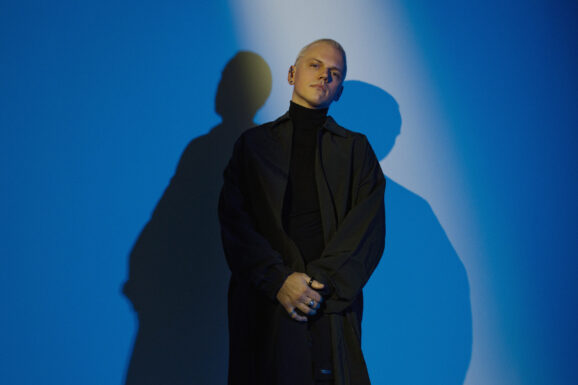We last heard from Chris Stamey on his double CD vocal/orchestral mammoth project with many high profile guests, last year’s New Songs for the 20th Century Vol. 1 &2. That was a shock to many who associate Stamey with the hard-driving rock of the group he co-founded, the dB’s, as well as his work with Alex Chilton and Big Star. With Brand New Shade of Blue Stamey continues in the jazz mode he’s been in for the past five years or so, this time choosing a more intimate approach, the small-combo sound of the late’50s and early ‘60s, a combination of bebop, cool jazz and modal influenced by artists such as Miles, Trane, Bill Evans, Monk and the pop flavorings of Burt Bacharach and Jimmy Webb. In other words, “songs for late nights and rainy days.”
The music began in old school style – just words and melodies on paper. Members of a North Carolina ad hoc collective of singers and players, known informally as the Fellow Travelers (several of whom appeared on the previous effort) gathered in Stamey’s studio earlier this year to bring life to these songs. Vocalist Brett Harris, who sang on just two of the 26 tracks in the previous album, became the principal vocalist for this one, singing on eight of the 13. Harris, a smooth crooner, is supported on some tracks by a quartet of Charles Cleaver (piano), Dan Davis (drums), and Jason Foureman (bass) with Stamey on guitar. As the album unfolds more musicians appear including the return of 19-year-old tenorist Elijah Freeman and mainstays of the N.C. jazz scene Will Campbell (alto and soprano), Evan Ringel (trombone) and Ben Robinson (trumpet).
Following three romantic tunes from Harris including the opening title track which is inspired by Coltrane, and the Jobim-influenced “je Ne Sais Quoi,” we are graced with the lovely voice of Lithuanian chanteuse Ramune Martin on the standout “I Don’t Think of You,” which features a Ben Webster-like solo from Freeman and lyrical bass work from Foureman. The tune was inspired by some of the pop vocabulary of Webb and Bacharach, especially “By The Time I Get to Phoenix.”
Harris returns for “In a Minor Key,” featuring solos from Freeman, Campbell and Robinson and exceptional piano from Cleaver, inspired by Monk’s sharp-nine and flat-five noir masterpiece, “Round Midnight.” The next is another standout, “It Must Be Raining Somewhere,” featuring bittersweet sixth chords and a turn from trombonist Ringel. The ultra-noirish “Un Autre Temps” owes to Monk as well, an instrumental excursion with expressive statements from Cleaver, Freeman and Campbell on soprano.
The jolting segues into “Come Home to Me” moves into a Tin Pan Alley vein with Cleaver’s bouncy stride piano and Ringel’s old school trombone. That’s followed by a reprise of the gorgeous “Late for the Party” taken instrumentally as opposed to Harris’ vocal version heard earlier. As the album moves through these different styles, contributions come from several musicians post-pandemic from their home studios. They are Dale Baker (bongos), Matt Douglas (Mountain Goats) (bass clarinet, baritone sax), Karen Galvin and Libby Rodenough (Mipso) (violins), Slippy McGhee (harmonica),Peter Holsapple (The dB’s) (banjo), Rachel Kiel (flute and harmonies), Mark Simonsen (vibraphone), and Josh Stamey (cello).
Stamey envisioned Harlen Arlen looking over his shoulder for “There’s a Dream Around the Corner” which has a gorgeous sequence where Harris’ vocal merges ever so continuously into Ringel’s trombone solo. The instrumental “Cerulean Is Lovely” finds the musicians freely aggressive as Cleaver backs Freeman on the B3 and Davis kicks up a storm on the traps. Harris returns for the pop-flavored “Speechless” and when he sings the chorus “you take my breath away” it sounds like a familiar tune we’ve heard. Cleaver is again on the organ and Slippy McGhee blows a brief harmonica solo. Vocalist Django Haskins (Old Ceremony) returns from the previous album with the Great Depression-styled “Dangling Cheek to Cheek,” featuring Holsapple’s banjo , Douglas’s bari sax, and some bizarre lyrics that evoke the Roaring ‘20s, Muhammad Ali and the three-point shot.
Unlike some albums that have a negative connotation of uneven or eclectic, those terms take on a positive quality here. While the strength of the album is in the noirish, sensuous ballads, the other unexpected touches of pop and other eras (like the closer) speak highly to Stamey’s versatile composition skills. If we didn’t know better, we’d think he was a jazz musician and composer throughout his entire storied career.









